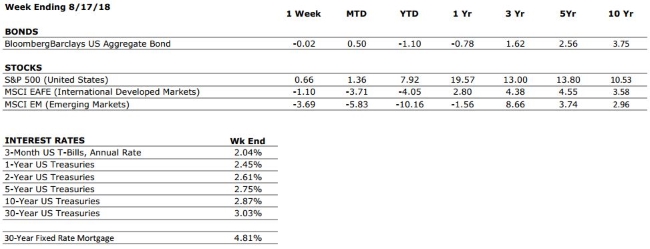Sources: Index Returns: Morningstar Workstation. Past performance is no guarantee of future results. Indices are unmanaged and cannot be invested into directly. Three, five and ten year returns are annualized excluding dividends. Interest Rates: Federal Reserve, Freddie Mac
US ECONOMIC HEAT MAP
The health of the US economy is a key driver of long-term returns in the stock market. Below, we grade 5 key economic conditions that we believe are of particular importance to investors.
|
CONSUMER SPENDING |
A+ |
Consumer spending is expected to remain healthy as individuals with lower tax rates spend their windfalls. |
|
FED POLICIES |
C- |
The Federal Reserve held pat following its most recent meeting, but it remains probable that two more rate hikes will be implemented before year-end. Rising interest rates tend to reduce economic growth potential and can lead to repricing of income producing assets. |
|
BUSINESS PROFITABILITY |
A |
Factset is reporting a blended earnings growth rate of 24.6% YoY for the 2nd quarter of 2018. Tax reform has played a major role, but the strength of the US consumer is boosting corporate profits as well. |
|
EMPLOYMENT |
A+ |
The US economy added 157,000 new jobs in July, and the unemployment rate dropped back below 4%. The job market remains very healthy. |
|
INFLATION |
B |
Inflation is often a sign of “tightening” in the economy, and can be a signal that growth is peaking. The inflation rate remains benign at this time, but we see the potential for an increase moving forward. This metric deserves our attention. |
|
OTHER CONCERNS |
||
|
INTERNATIONAL RISKS |
5 |
The above ratings assume no international crisis. On a scale of 1 to 10 with 10 being the highest level of crisis, we rate these international risks collectively as a 5. These risks deserve our ongoing attention. |
The “Heat Map” is a subjective analysis based upon metrics that VNFA’s investment committee believes are important to financial markets and the economy. The “Heat Map” is designed for informational purposes only and is not intended for use as a basis for investment decisions.


 We are so pleased to share that our team has been voted Best Financial Planner by the readers of Lehigh Valley Magazine for the seventh time – 2010, 2011, 2012, 2013, 2014, 2017, 2018!
We are so pleased to share that our team has been voted Best Financial Planner by the readers of Lehigh Valley Magazine for the seventh time – 2010, 2011, 2012, 2013, 2014, 2017, 2018!